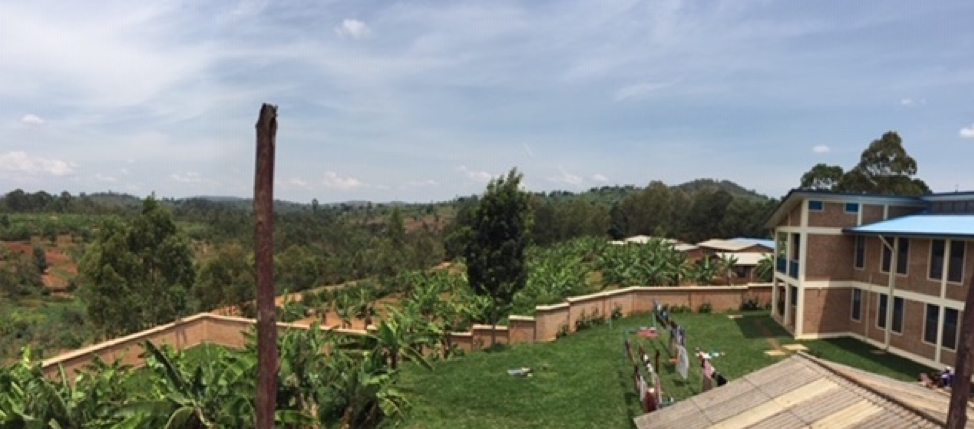“The church exists to set up in the world a new sign which is radically dissimilar to the world’s own manner and which contradicts it in a way which is full of promise.” – Karl Barth[1]
Tucked into the green Burundian hills of the equatorial African highlands, in a side room of a hospital building that was never meant to stand as long as it has, my team is gathered around in a circle. Some sit on benches; some of the edge of an on-call bed. Some are nurses. Most are students of various stripes. It’s Saturday morning, and we have come together to face the darkness in the name of Jesus and to see how we might shine his light in the adjacent wardroom.
My Burundian intern is telling us about a twenty-year-old young man who came in overnight with bad pneumonia. The story doesn’t sound too unusual until he describes the patient’s physical exam.
“His weight is twenty-three kilos” (That is, fifty-one pounds).
“Twenty-three kilos?” I exclaim in surprise.
“Yeah, he is the size of a child.”
“Does he speak?”
“No, he’s never spoken.”
“Does he walk?”
“No, he’s always been bedridden. He has some bedsores, but they are clean.”
There is a bit of context that is necessary to understanding just why this story is so incredible. People with significant handicaps usually don’t survive very long in Burundi. In fact, I have never seen someone this disabled who has survived to this age. The disabled are often neglected and devalued. Even if they are not, something goes wrong. They can many times have an injury or an infection that goes unnoticed for too long—until it’s too late.
“Well,” I remark to my gathered team of nurses and students,” this family deserves our admiration for taking such good care of their child for so long.”
“Actually,” the intern interjects, “his family abandoned him a long time ago. He’s been raised by Catholic nuns in a home for handicapped children.”
“Oh,” I pause, “then I guess we owe that admiration to the nuns. They have shown just how serious they are that every person bears God’s image. Let’s try and do our best to continue the same while he’s under our care here in the hospital.”
After we’re done discussing, we pray and then head out to starting seeing our patients. We go from bed to bed in the big open room that serves as our ward. After we finish, we head over to the private rooms to see an old man who has been there for several days after a stroke. Our hospital has eight private rooms, and the best of them are on the second floor with a gorgeous view of the Burundian hillsides, carpeted with eucalyptus and banana trees. I jokingly call the nicest one the presidential suite. This old man’s family has a bit of money, so they paid extra to hospitalize him in one of these exclusive rooms on the bottom floor.

When we leave his room, I get ready to leave the building, but the intern stops me. “No, upstairs,” he reminds. I don’t remember having a patient upstairs. “The young boy that came in yesterday,” my intern says in response to the puzzled look on my face.
We climb the stairs, and there, in the second-nicest private room, is our new patient—all twenty-three kilos of him curled up into a fetal position, breathing oxygen through a pair of nasal prongs. He’s dressed in a nice t-shirt, and his helper is sitting on the bed next to him. It’s a truly beautiful moment, and it reminds me of the words of Jesus in Matthew 20:16.
I turn to my team. “You remember how Jesus said ‘The last will be first, and the first will be last?’” There are several sparks of recognition on their faces. They are blown away that the nuns paid for this boy to be hospitalized in such a nice room, and they immediately get the connection between the situation and Jesus’s words. Here, in a world full of scarcity, the church has taken a small nonverbal boy, who doesn’t usually even survive to this age, and hospitalized him next door to the presidential suite.
Perhaps the clearest take-home point from all of Jesus’s preaching on the kingdom of God is that it is upside-down from what we think. The meek inherit the earth. Those who mourn are comforted. The guests of honor are the ones who can’t possibly pay you back. He who loses his life will save it.
It doesn’t make sense, in the world’s poorest country, where even lots of healthy and promising young people can’t get the health care they need, to care for a permanently handicapped kid with such extravagance. It seems like a bad strategy with little visible benefit. It is a good idea for only one reason—It is consistent with God’s kingdom. The outcome of such generous excess may seem like an enigma, but the final aftereffect is not our ultimate concern. Obedience is. The rest is in God’s hands.
It’s worth making a distinction here. One could conclude that such beautiful generosity will be God’s way of transforming the hearts of those who experience or witness it. This is true, and thankfully God does transform our hearts. But the meek will not inherit the earth via our transformed hearts. The meek will inherit the earth precisely because God will give it to them. The principles of God’s upside-down kingdom are not natural for a fallen world. They are true only because God acts and makes them true.
In Philippians 2, we see the great arc of Jesus emptying himself. Leaving his celestial glory, he gives himself to be born as a man. Then he gives himself up to death, even death on a cross. The first becomes last. This whole trajectory is foolishness in our eyes, but obedience to his Father is Jesus’s only concern. Then in verse 9, at the very nadir of this arc, God acts. “Therefore God has highly exalted him and bestowed on him the name that is above every name.” By the power of God, the promises of his upside-down kingdom are made true, and it is a wonder. “This is the Lord’s doing; it is marvelous in our eyes” (Psalm 118:23 ESV).
The beauty of this upside-down kingdom is self-evident. Anyone can see it, and we celebrate it particularly in the lowliness of the nativity. But in addition to being beautiful, it is true by the power of God. Even when we cannot understand how, God has declared these principles to be true, and he is more faithful than we are wise. He will act, and we will see it.
Until then, the church exists to be a sign of
this kingdom. I saw a bit of it reflected last Saturday. The last became first.
That act was radically dissimilar to the world’s own manner, but even as it
contradicted the ways of the world, it did so in a way that was full of
promise. We were there to see it. It was just a glimpse of what’s to come.
[1] Karl Barth, from Church Dogmatics, as quoted in Stanley Hauerwas and William H. Willimon, Resident Aliens (Nashville, TN: Abingdon Press, 1989), 183.
Promises in the Dark: Walking With Those in Need Without Losing Heart
Promises in the Dark by Dr. Eric McLaughlin strengthens the hearts of readers to persevere in God’s calling to walk with those in need. As a missionary doctor in Africa, McLaughlin knows how walking closely with those who suffer and bearing others’ burdens can easily lead to burnout or cynicism—unless we find the path to perseverance that the Lord provides.






